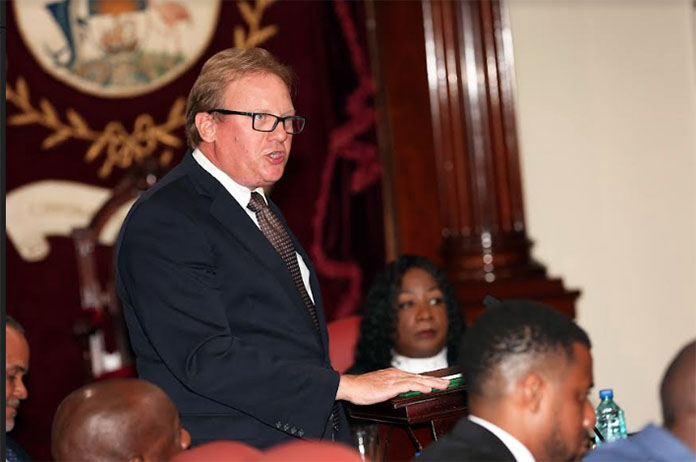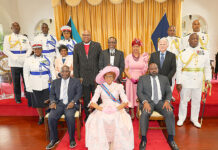
NASSAU, The Bahamas – The Government of The Bahamas through legislation has implemented increased and better coordinated systems of protection and support for victims of violence: the Protection Against Violence Bill 2023 was passed in the Senate on Wednesday, 2nd August. Attorney-General and Minister of Legal Affairs, Senator the Hon. L. Ryan Pinder outlined the main objectives of the Bill. He said that the Bill is a multi-faceted one aimed at covering several issues not previously covered or no longer relevant in the existing Bill.
“The Protection Against Violence Bill, 2023 is a comprehensive legislation designed to provide protection and support for victims of violence in The Bahamas. The Bill not only seeks to uphold the nation’s commitments under international conventions such as the Convention on the Elimination of all Forms of Discrimination against Women, 1981 (CEDAW) and the Inter-American Convention on the Prevention, Punishment and Eradication of Violence against Women, 1994 (Convention of Belem do Para), but also creates a domestic framework for supporting victims, handling complaints, and raising public awareness, ” said Senator Pinder.
He said that the Bill is not about imposing new bureaucratic structures, but about improving response mechanisms, better coordinating efforts, and providing much-needed support to victims. Mr. Pinder said that the bill should be seen as “an investment in the safety, dignity, and wellbeing of Bahamian citizens.”
The Senator outlined the general objectives of the Protection Against Violence Bill, 2023 and said that the Bill will provide a national strategy to prevent and respond to violence by promoting a multi-disciplinary approach to community and services to assist victims and manage offenders,
provide for a system of information gathering to generate reliable statistics on violence against women which result in death, and compliance with regional and international human rights treaty obligations.
The Bill allows for the establishment of the Protection Against Violence Commission, which will work with the responsible Minister to ensure that victims are treated with compassion and dignity and have access to justice without unnecessary delays and impediments. The Minister said that the work of the commission will inform policies, promote awareness of human rights, allocate resources for specialised services, promote education and sensitivity training, and promote programmes and policies that are gender-sensitive, equitable and lead toward greater gender equality and improved gender relations.
Not only would the commission advise the government on policies, but will also oversee the implementation of a National Strategic Plan for Combatting and Responding to Violence.
“The Commission will serve as the gathering point for collaboration and coordination of all stakeholders who work to combat and respond to violence. The Commission will also keep the government abreast of the need to maintain an adequate number of shelters. The Commission is also responsible for establishing a Federation of Community Organisations Against Violence to act as an apex body of support services to victims, the vehicle that will bring together the various NGOs and other community organisers together and ensure that their input plays a major role in the Commission’s work. This is an acting Commission, one designed to provide results for the benefit of all those who are victims of violence,” he said.
The Commission, he noted, is comprised of representatives from the Ministries of Health, Local Government, Education, Science and Technology, the Attorney General’s Office and Legal Affairs, Youth, Sports, and Culture, as well as the Department of Social Services, the Commission, its Foundation, and Divisional Heads, as well as three other appointed stakeholders with active involvement on these issues. “This composition,” he said, “is substantially the same as the composition of Gender-Based Violence Authority found in the 2016 Bill.”
The Senator said that the bill also allows for the establishment of the Protection Against Violence Foundation, which will be used to raise funds to support the Commission. He pointed out that the funds of the Foundation can never be used for the personal benefit of any directors, officers, or private persons.
Included in the Commission’s portfolio is a technical body called the ‘Protection Against Violence Secretariat’ which will coordinate, formulate, publish and implement protocols and procedures, manage applications for funding and assistance, as well as oversee negotiations with regional and international bodies and assist the Commission with matters of importance.
The Bill will also provide for compliance with Regional and International Obligations – Rights of Victims of Violence.
“Noted in the draft Bill are the binding principles to which the Protection Against Violence Commission must adhere to in carrying out its functions. These binding principles align with the CEDAW and Belem Do Para and prescribe that victims are treated with an enhanced level of compassion and respect, and are able to access prompt justice and redress through strengthened judicial and administrative mechanisms,” said Mr. Pinder.
The Commission will engage legal services to assist with complaints, liaise with police investigators to ensure that they are upholding their obligations, and provide legal guidance as necessary throughout the process. The legal element will play an even more important role with the introduction of a slate of protected rights under this Bill. “There will be a Right To Be Treated With Compassion And Dignity, which means that every victim of violence has the right to be treated with compassion and dignity by EVERY person who comes in contact with them in a professional capacity.”
He continued: “You will have the Right to Confidentiality from all people who provide any kind of relevant service or support to you, including members of the commission itself and persons acting on behalf of the Commission. That confidentiality will apply to your identity, the offender’s identity, the identity of witnesses, and the circumstances of the offence. Trust is such a critical element in empowering survivors of violence and encouraging others to step up. Through the establishment of these rights, we are taking the necessary steps to protect all parties involved.”
The Minister said that a major element of the Bill is focused on Procedures for the Making and Handling of Complaints, which allows those directly impacted by violence, as well as those with information about an act of violence, to make a formal complaint. “Any formal complaint will be made in-person to a police officer, which will be signed and dated inclusive of all relevant details. Police officers will be required by law to investigate such complaints, and in the course of that investigation will be expected to assist the victim with obtaining treatment, getting to a safe space, accompanying the victim to remove personal belongings, informing the victim of necessary details and procedures, including the importance of preserving and collecting evidence, and connecting them with the Protection Against Violence Commission.”
As it relates to Care and Support Services, he said the Bill has provisions that speak specifically to sexual violence and abuse and expected related care and support services. “The Commission will be obligated to provide safe housing and shelter for women who are victims of sexual violence and any accompanying children,” he explained. “The Commission will make any necessary accommodations for the arrangement of psychological, medical and legal assistance. There is also an obligation to provide safe spaces for victims in addition to age-appropriate counselling, group sessions, and alternative means of resolution and restorative justice. It was very important for the Bill to directly support victims of sexual violence as a group that specifically requires support that is not always available in the way it needs to be. Thankfully, we are providing for those specific needs through this Bill.
In instances when violence results in death, the Senator said that a ‘Violent Fatality Review team’ — comprised of a retired Supreme Court Justice and representatives from Social Services, Public Health, and the Public Health Authority, in addition to two other appointees recommended by the Commission — will make recommendations to the Minister regarding potential legal changes based on their research and their review of closed cases. “The objective,” he noted ” is not to respond to individual cases, but to take a big-picture view of the situation and provide recommendations to respond to identified trends in ways that are likely to directly address any emerging contributory issues through legislative and policy change or specific initiatives and actions.”
“This is the framework of the Protection Against Violence Bill, 2023 fulfilling the recommendations as set on in 2017 narrowing the focus and prioritizing the creation of institutions/mechanisms for GBV prevention and response,” he said. “Specifically, the recommendation was that this Bill should focus exclusively on establishing the Gender Based Violence Authority and its institutions. It was agreed that reference to further revision of the law, policy and other matters could be thoroughly addressed upon the establishment of the Authority.”
He also pointed to other efforts that the bill would address.
“The work on the legislative framework is not the only aspect to close the gaps with respect to GBV and violence in general. I noted in the discussion of the 2015 GAP analysis the second Gap is that the archipelagic nature of The Bahamas presents major challenges in terms of implementation, monitoring and enforcement of a national GBV system. We have been working hard to address this issue. The Government continues its efforts to implement the National Strategic Plan to address Gender-Based Violence, with the most recent achievement being the implementation of the Family Island Coordination Councils (FICC) to address GBV. The purpose of the Councils are to focus on community-based partnerships to prevent GBV in our Family Island communities and to ensure that victims of GBV receive professional support and clinical services needed to recover from such situations. These Councils represent a multi-sectoral, coordinated approach to achieving an effective and integrated response to GBV while assisting in the rehabilitation of the perpetrators of abuse.”
He said that this is complemented by the efforts of ‘Men’s Desk’ in building support for the prevention of GBV against women. ‘The Urban Renewal Task Force Relief Unit also conducts door-to-door home visits to residents experiencing conflict or abusive relationships to problem solve and prevent the escalation of violence. The ten (10) Urban Renewal Centers throughout the country are mandated to report all incidents of GBV to the Relief Task Force Unit. The Department of Social Services provides temporary shelter for survivors of GBV, onsite counseling and accompaniment to court.”
He said that the government continues to take a holistic approach to violence, and particularly gender-based violence.
“Overall, the Protection Against Violence Bill, of 2023, is a testament to The Bahamas’ dedication to eradicating violence against women, ensuring victim support, and promoting public education about this pressing issue. After the passage of this Bill, we will need to make a tremendous effort to generate and allocate resources, to hold training sessions, and to update our systems and processes to meet our goals.”








